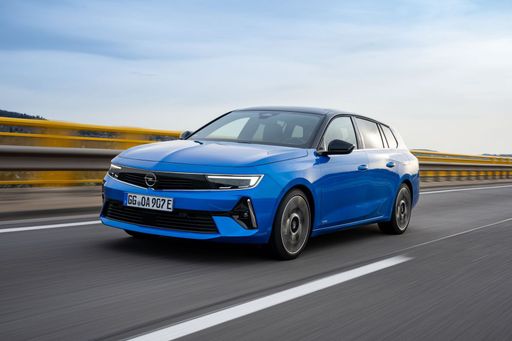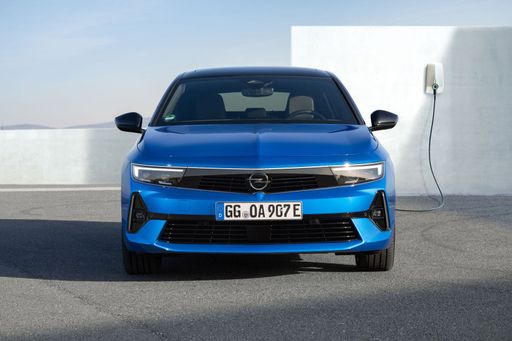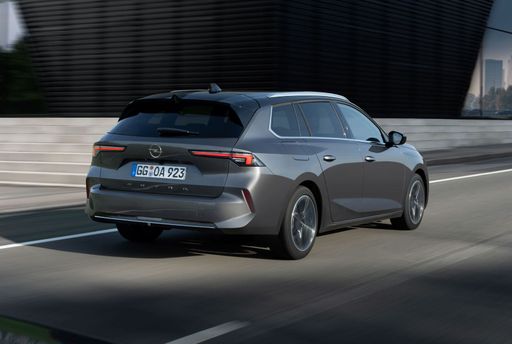Nissan Leaf VS Vauxhall Astra Sports Tourer – Specs, Efficiency & Price Comparison
Which model is the better choice – the Nissan Leaf or the Vauxhall Astra Sports Tourer? We compare performance (217 HP vs 225 HP), boot capacity (394 L vs 597 L), efficiency (16.70 kWh vs 15.80 kWh1.30 L), and of course, the price (30800 £ vs 26300 £).
Find out now which car fits your needs better!
The Nissan Leaf (Hatchback) is powered by a Electric engine and comes with a Automatic transmission. In comparison, the Vauxhall Astra Sports Tourer (Estate) features a Petrol, Diesel, Plugin Hybrid, Electric or Petrol MHEV engine and a Manuel or Automatic gearbox.
When it comes to boot capacity, the Nissan Leaf offers 394 L, while the Vauxhall Astra Sports Tourer provides 597 L – depending on what matters most to you. If you’re looking for more power, you’ll need to decide whether the 217 HP of the Nissan Leaf or the 225 HP of the Vauxhall Astra Sports Tourer suits your needs better.
There are also differences in efficiency: 16.70 kWh vs 15.80 kWh1.30 L. In terms of price, the Nissan Leaf starts at 30800 £, while the Vauxhall Astra Sports Tourer is available from 26300 £.
Compare all the key specs now and find out which model fits your lifestyle best!
Nissan Leaf
The Nissan Leaf stands out as a pioneering model in the realm of electric vehicles, known for its impressive blend of practicality and eco-friendliness. It offers a smooth and quiet driving experience, making it an ideal choice for city commuting and longer journeys alike. The interior design is both comfortable and intuitive, providing drivers with a sense of modernity and ease of use.
details @ germany.nissannews.com
@ germany.nissannews.com
 @ germany.nissannews.com
@ germany.nissannews.com
 @ germany.nissannews.com
@ germany.nissannews.com
 @ germany.nissannews.com
@ germany.nissannews.com
Vauxhall Astra Sports Tourer
The Opel Astra Sports Tourer is a stylish and practical estate car that offers a versatile blend of comfort and functionality. With its sleek design and spacious boot, it caters perfectly to families and those with an active lifestyle. The interior is thoughtfully designed, providing both driver and passengers with a comfortable and technologically enhanced experience.
details @ media.stellantis.com
@ media.stellantis.com
 @ media.stellantis.com
@ media.stellantis.com
 @ media.stellantis.com
@ media.stellantis.com

|

|
|
|
|
Costs and Consumption |
|
|---|---|
|
Price
30800 - 37200 £
|
Price
26300 - 41800 £
|
|
Consumption L/100km
-
|
Consumption L/100km
1.3 - 6.1 L
|
|
Consumption kWh/100km
16.7 - 17.8 kWh
|
Consumption kWh/100km
15.80 kWh
|
|
Electric Range
270 - 385 km
|
Electric Range
57 - 411 km
|
|
Battery Capacity
39 - 59 kWh
|
Battery Capacity
11.3 - 51 kWh
|
|
co2
0 g/km
|
co2
0 - 137 g/km
|
|
Fuel tank capacity
-
|
Fuel tank capacity
42 - 52 L
|
Dimensions and Body |
|
|---|---|
|
Body Type
Hatchback
|
Body Type
Estate
|
|
Seats
5
|
Seats
5
|
|
Doors
5
|
Doors
5
|
|
Curb weight
1580 - 1756 kg
|
Curb weight
1394 - 1760 kg
|
|
Trunk capacity
385 - 394 L
|
Trunk capacity
516 - 597 L
|
|
Length
4490 mm
|
Length
4642 mm
|
|
Width
1788 mm
|
Width
1860 mm
|
|
Height
1540 - 1545 mm
|
Height
1443 - 1481 mm
|
|
Payload
384 - 415 kg
|
Payload
424 - 497 kg
|
Engine and Performance |
|
|---|---|
|
Engine Type
Electric
|
Engine Type
Petrol, Diesel, Plugin Hybrid, Electric, Petrol MHEV
|
|
Transmission
Automatic
|
Transmission
Manuel, Automatic
|
|
Transmission Detail
Reduction Gearbox
|
Transmission Detail
Schaltgetriebe, Automatikgetriebe, Automat. Schaltgetriebe (Doppelkupplung)
|
|
Drive Type
Front-Wheel Drive
|
Drive Type
Front-Wheel Drive
|
|
Power HP
150 - 217 HP
|
Power HP
130 - 225 HP
|
|
Acceleration 0-100km/h
6.9 - 7.9 s
|
Acceleration 0-100km/h
7.6 - 11 s
|
|
Max Speed
144 - 157 km/h
|
Max Speed
170 - 235 km/h
|
|
Torque
320 - 340 Nm
|
Torque
230 - 360 Nm
|
|
Number of Cylinders
-
|
Number of Cylinders
3 - 4
|
|
Power kW
110 - 160 kW
|
Power kW
96 - 165 kW
|
|
Engine capacity
-
|
Engine capacity
1199 - 1598 cm3
|
General |
|
|---|---|
|
Model Year
2019
|
Model Year
2023 - 2025
|
|
CO2 Efficiency Class
A
|
CO2 Efficiency Class
D, E, B, A, C
|
|
Brand
Nissan
|
Brand
Vauxhall
|
Nissan Leaf
Introduction to the Nissan Leaf: A Pioneer in Electric Mobility
The Nissan Leaf has established itself as a trailblazer in the realm of electric vehicles (EVs) since its launch. As we delve into its present-day iterations, the Leaf continues to soar in popularity due to remarkable advancements in technology and sustainability. Let's explore what makes the Nissan Leaf a standout in today's automotive market.
Power and Performance: Under the Hood of the Nissan Leaf
The Nissan Leaf boasts a power output ranging from 150 to 217 PS, depending on the battery option chosen. The vehicle's electric motor, a product of cutting-edge engineering, offers instant torque ranging from 320 to 340 Nm, resulting in impressive acceleration capabilities. The 0 to 100 km/h dash is achieved in as little as 6.9 seconds, showcasing its prowess in electric performance.
Battery Technology: Efficient Energy Management
When discussing the Nissan Leaf, battery technology is at the forefront. The available battery capacities range from 39 to 59 kWh, supporting an electric range between 270 to 385 km. This flexibility allows drivers to choose a model that best fits their driving habits, providing peace of mind for longer journeys without frequent recharging.
Sustainability: The Environmental Edge
One of the primary attractions of the Nissan Leaf is its commitment to sustainability. As an all-electric vehicle, it produces zero CO2 emissions, placing it in the top tier of the CO2-efficiency class with an 'A' rating. This clean energy approach contributes significantly to reducing environmental impact and supports Nissan's drive towards a greener future.
Design and Comfort: Aesthetic Appeal and Practicality
The Nissan Leaf is not just about efficiency; it's also designed for comfort and utility. With its sleek hatchback body and dimensions of 4490 mm in length, 1788 mm in width, and a height of up to 1545 mm, it offers ample interior space. The boot capacity ranges from 385 to 394 litres, providing sufficient storage for everyday needs. The model accommodates five passengers comfortably, ensuring a pleasant ride for everyone.
Innovations and Safety: Advanced Features for Peace of Mind
Nissan equips the Leaf with an array of intelligent features that enhance safety and convenience. The available equipment lines, including N-CONNECTA, Tekna, e+ N-CONNECTA, and e+ Tekna, offer varying levels of technology integration. ProPILOT Assist, e-Pedal, and a comprehensive suite of driver-assistance technology are just a few examples that highlight Nissan's commitment to innovation in the EV market.
Conclusion: The Nissan Leaf Continues to Lead
With prices ranging from €35,900 to €43,400, the Nissan Leaf remains an attractive choice for those looking to embrace electric mobility. It perfectly balances performance, design, and sustainability, making it a compelling choice in the competitive EV landscape. The Nissan Leaf not only represents the future of driving but also reinforces why it continues to be a leader in the electric vehicle community.
Vauxhall Astra Sports Tourer
Discover the Opel Astra Sports Tourer: Innovation Meets Performance
The Opel Astra Sports Tourer has long been a staple in the world of estate cars, providing a perfect blend of versatility, comfort, and performance. The latest iterations of this model have raised the bar even higher with cutting-edge technology and an array of engine options that cater to various driving preferences. In this article, we explore the technical details and innovations that make the Opel Astra Sports Tourer a standout choice in its category.
Engine Choices: A Spectrum of Efficiency and Power
The Opel Astra Sports Tourer offers a selection of powertrains that ensure there's something for everyone. From super-efficient hybrid models to robust petrol and diesel options, drivers can choose based on their needs. The plug-in hybrid variants are particularly noteworthy, offering an impressive electric range of up to 65 km and fuel consumption as low as 1.3 L/100 km, showcasing Opel's commitment to sustainability.
Technical Highlights: Advanced Engineering
Under the bonnet, the Astra Sports Tourer features a range of three to four-cylinder engines, with capacities ranging from 1199 to 1598 cm³. The power output varies between 110 PS (81 kW) to a vigorous 225 PS (165 kW), ensuring that whether you need a car for city commutes or long-distance drives, the Astra Sports Tourer has an option suited for you.
Acceleration times from 0-100 km/h range from 7.6 to 11 seconds, paired with maximum speeds between 170 to 235 km/h, making this estate not only efficient but also quick on its wheels when needed.
Innovative Design: Space Meets Style
With a length of 4642 mm and a width of 1860 mm, the Astra Sports Tourer offers generous interior space without compromising on style. Its boot capacity ranges from 516 to 597 litres, ensuring there’s plenty of room for luggage on long trips. Additionally, innovative design elements make this vehicle stand out, particularly in its GS and Ultimate lines, which offer premium features and finishes.
State-of-the-Art Technology: The Modern Drive
The Astra Sports Tourer is packed with technology to enhance the driving experience. This includes an advanced infotainment system and a suite of driver assistance features. These modern touches ensure that every journey is as comfortable and safe as possible, demonstrating Opel’s focus on blending practicality with cutting-edge innovation.
Conclusion: The Future of Estate Vehicles
With a perfect balance of efficiency, performance, and innovative design, the Opel Astra Sports Tourer redefines what drivers can expect from an estate vehicle. Whether prioritising low running costs or a sporty drive, this model delivers across various parameters. As Opel continues to innovate and respond to the evolving needs of motorists, the Astra Sports Tourer stands as a testament to their engineering prowess and visionary approach to automotive design.
The prices and data displayed are estimates based on German list prices and may vary by country. This information is not legally binding.
